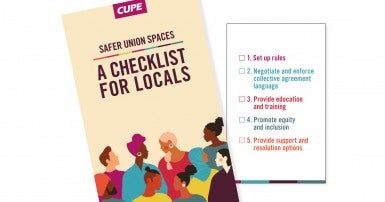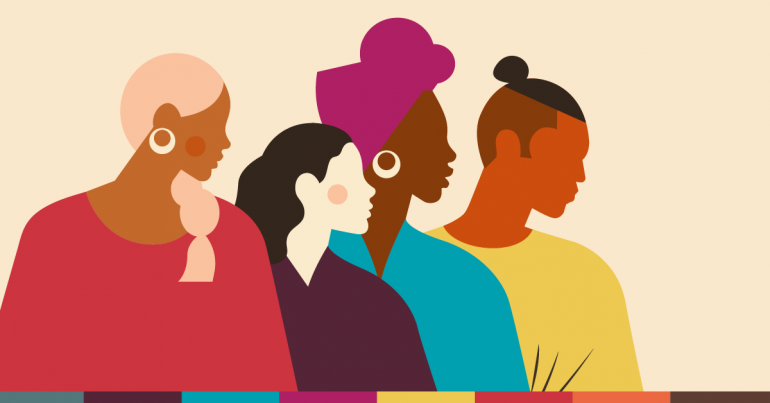
5 ways to make your local safer and more inclusive
- Set up rules
- Negotiate and enforce collective agreement language
- Provide education and training
- Promote equity and inclusion
- Provide support and resolution options
1. Set up rules
Make sure your local has rules against harassment and discrimination. These should include an anti-harassment policy, code of conduct and equality statement. Your local should also include anti-harassment and anti-discrimination provisions in its bylaws.
When creating these rules, it’s important to consider different aspects of people’s identities and how they can be affected by discrimination. This is called an “intersectional lens.” You can also think about appointing someone on the executive to deal with harassment and discrimination issues.
Delegates CUPE’s 2021 National Convention changed our union’s Code of Conduct. The Code of Conduct now applies to all events held by CUPE locals.
The next time your local reviews its bylaws, the Code of Conduct should be updated to reflect these changes or included as an appendix for reference by members. Locals can find sample Code of Conduct language at cupe.ca when updating these changes.
CUPE’s Code of Conduct and Equality Statement are available at cupe.ca.
2. Negotiate and enforce collective agreement language
Strong anti-harassment policies and collective agreement language help employers prevent and deal with harassment. They also help workers understand what harassment is, how it can happen, what the law says about it and how to respond appropriately. The goal is to eliminate or at least minimize harassment in the workplace.
Many collective agreements have anti-harassment language or language about things that relate to harassment, like discrimination, violence, health and safety, workload and the duty to accommodate.
Workplaces may also have anti-harassment or anti-discrimination policies that exist outside of the collective agreement.
By bargaining and enforcing anti-harassment language, locals can make sure everyone is treated fairly and that there are consequences for harmful behaviour. This helps create a safer and more respectful work environment for everyone.
CUPE offers many tools and resources to support locals during bargaining. These include Bargaining Equality and Stop harassment: A guide for locals. Other bargaining resources can be found at cupe.ca.
3. Provide education and training
Teach new executives and members about anti-harassment policies in your local and workplace. Make sure executives understand their roles and responsibilities, and that members know who to contact if they have a complaint.
Help members understand why discrimination and harassment are wrong, and how they harm workers and the union. Educate members about human rights, discrimination and harassment. For instance, anti-harassment training and bystander training can give members the tools they need to create a harassment-free local.
Train stewards and the executive to recognize, challenge and respond to harassment. They should also learn to respond to harassment in a way that considers the impacts of trauma.
CUPE offers workshops on health and safety, violence, harassment and human rights. You can find more information in CUPE’s workshop catalog.
In addition, it’s a good idea to have ongoing discussions and training for members to prevent harassment. These are good ways to encourage member engagement and participation.
4. Promote equity and inclusion
Keep working to make your local fair and inclusive for everyone. Here are some things you can do:
Spread the word:
Write articles for your newsletter or website to teach people how to stop harassment and discrimination. Talk about the importance of consent and treating everyone with respect.
Bring in guest speakers:
Invite someone to speak at a union event and share their knowledge about fairness and inclusion. This can help everyone learn more and understand why it’s important.
Support the community:
Sponsor a community event to show your local cares. This can bring people together and make a positive difference.
Start a campaign:
Launch a campaign to raise awareness about harassment and consent. Share information about it during union meetings and in newsletters.
Encourage diverse leaders:
Look for and support people from different backgrounds to become stewards, executives and committee members. This includes women, Indigenous people, Black and racialized people, persons with disabilities and 2SLGBTQI+ people. Having leaders that reflect the diversity of your local helps make sure everybody’s voice is heard.
Team up:
Work with local community groups that fight against violence, harassment and discrimination. By supporting and joining forces with them, you can make a bigger impact and create positive changes together.
5. Provide support and resolution options
Violence, harassment and discrimination are not always reported. Surveys can help you figure out what prevention measures are working and what actions the local can take to make it safer and more welcoming for all. They can also help educate members and solicit suggestions for change and support. Locals can find sample harassment and discrimination survey questions at cupe.ca.
It’s important to offer support to members impacted by violence and harassment, including support that does not require making a formal complaint or engaging in a formal process. Your local should have processes that give members the flexibility to change course if needed. Locals should also have restorative options available so that members can work with trained facilitators to engage with one another about any harm that has taken place.
Note: Printed copies are currently out of stock.




